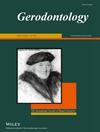To explore the attitudes, facilitators and barriers in providing oral care for inpatients with dysphagia post-stroke as perceived by healthcare professionals.
Dysphagia is a common complication of stroke and is associated with a higher incidence of aspiration pneumonia, malnutrition and dehydration. In the acute phase of stroke recovery, a dental professional is not usually part of the multidisciplinary team caring for the patient and oral care is the responsibility of the healthcare professionals in the stroke unit. There is a lack of high-quality evidence to demonstrate the most effective method of providing oral care for patients with dysphagia post-stroke.
This was a single-site study conducted with healthcare professionals working in the Stroke Unit of Cork University Hospital in Ireland, using focus groups and a qualitative thematic analysis approach.
A total of three focus groups were conducted in the Stroke Unit with 17 healthcare professionals. The focus groups included representation from all healthcare professional groups providing direct clinical care to patients on the Stroke Unit including geriatric medicine, dietetics, speech and language therapy, healthcare assistance, nursing, occupational therapy and physiotherapy. A qualitative thematic analysis was carried out and seven overarching themes emerged from the data. Three themes related to facilitators to providing oral care for this patient group: (i) a focus on oral care in both policy and practice, (ii) expanding professional roles in the provision of oral care, (iii) perceived importance of oral care in recovery and rehabilitation. Four themes related to barriers to the provision of oral care for this patient group: (i) lack of confidence and concerns related to the perceived risk for patients with dysphagia, (ii) unique challenges of patient and stroke-related factors, (iii) lack of resources and time and (iv) perceived importance of oral care in recovery and its relative importance with competing demands.
Members of the stroke multidisciplinary team believe that they all have a part to play in the delivery of oral care for patients with dysphagia post-stroke. Opportunities exist for the development of multidisciplinary interventions to improve the oral cavity assessment and oral care provided in the Stroke Unit.


